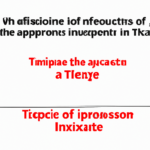Wealth redistribution faces key arguments from individuals who emphasize personal responsibility, incentives, and economic efficiency. Critics argue that redistributive policies discourage people from working hard and innovating, as they may no longer reap the full benefits of their efforts. They contend that such policies undermine the notion of personal responsibility and individual freedom, instead promoting a reliance on government support. Additionally, opponents highlight the potential negative impact on economic growth, as wealth redistribution may reduce the incentive for investment and entrepreneurship. They argue that a market-based system, where individuals retain their earned wealth, is more effective in promoting prosperity and overall societal progress.
Table of Contents
- Economic efficiency
- Incentive reduction
- Individual responsibility
- Loss of personal freedoms.
- Market distortion
(Income and Wealth Inequality: Crash Course Economics #17)
Key arguments against wealth redistribution:
Wealth redistribution has been a hotly debated topic, with proponents arguing for a more equitable distribution of resources and opponents voicing concerns over the potential negative consequences. One of the main arguments against wealth redistribution is that it disincentives hard work and entrepreneurship. Critics argue that if people know that their wealth will be taken and redistributed to others, they may be less motivated to work hard and take risks, ultimately stifling economic growth.
Another argument against wealth redistribution is that it undermines personal responsibility. Opponents argue that individuals should be responsible for their own success or failure and that wealth redistribution creates a culture of dependency. They believe that by redistributing wealth, the government is promoting a welfare state rather than encouraging self-sufficiency and self-reliance.
Critics also argue that the redistribution of wealth is inherently unfair. They believe that individuals have a right to keep what they earn through their own hard work and that the government should not interfere with this natural process. Redistribution, they argue, takes away the rewards and incentives for individual success and innovation.
Additionally, opponents assert that wealth redistribution can have adverse effects on the economy. They argue that it reduces the incentive for individuals to invest and save, leading to a decrease in overall productivity and economic growth. Furthermore, critics argue that it can result in a brain drain, as high earners may choose to relocate to countries with more favorable tax policies.
In conclusion, while wealth redistribution may seem like an attractive solution to address economic inequality, opponents argue that it can have negative consequences. Arguments against wealth redistribution often revolve around the potential disincentive for hard work and entrepreneurship, the undermining of personal responsibility, perceived unfairness, and its potential impact on the economy. These arguments highlight the complexity of the issue and the need for careful consideration of its implications.
Economic efficiency
Economic efficiency is a crucial concept underlying the arguments against wealth redistribution. It refers to the ability of an economic system to allocate resources in the most productive and optimal manner. The belief is that market forces, when left to their own devices, naturally lead to economic efficiency.
One key argument against wealth redistribution is that it undermines economic efficiency. Critics of wealth redistribution argue that it disrupts the incentives that drive individuals to work hard and take risks. They claim that by imposing heavy taxes on the wealthy, redistribution reduces the rewards of success and discourages individual effort.
Furthermore, proponents of free markets argue that wealth redistribution interferes with the mechanism of supply and demand. They suggest that allowing market forces to determine the distribution of wealth leads to greater efficiency in resource allocation. In their view, the invisible hand of the market, guided by self-interest, ensures that resources go where they are most valued and needed.
Critics also contend that wealth redistribution often leads to misallocation of resources. They argue that government intervention in redistributing wealth can result in inefficient allocation decisions. By redirecting resources towards politically favored projects or sectors, policymakers may disregard market-driven signals of demand and supply.
Another concern raised against wealth redistribution is the potential negative impact on economic growth. Critics argue that when wealth is taken from the wealthy, it reduces their ability to invest, innovate, and create jobs. This, in turn, leads to a slowdown in economic growth, harming both the wealthy and the less fortunate.
Overall, opponents of wealth redistribution argue that the pursuit of economic efficiency should outweigh the desire for wealth redistribution. They believe that market forces, motivated by individual self-interest, are best suited to allocate resources efficiently. They assert that wealth redistribution interferes with market mechanisms and can have unintended negative consequences on economic growth.
However, proponents of wealth redistribution contend that addressing income inequality is necessary for social stability and improved overall well-being. They argue that a more equitable distribution of wealth can lead to increased social mobility and reduced social unrest. It is an ongoing debate that touches on fundamental questions of fairness, social justice, and the role of government in economic affairs.
Incentive reduction
Incentive reduction is a critical argument against wealth redistribution. This is the belief that if people are taxed heavily and their wealth is redistributed, they will lose motivation to work hard and achieve success. The fear is that when individuals no longer have the potential to greatly benefit from their efforts, they will become less productive members of society.
Proponents of incentive reduction argue that when people are allowed to keep the majority of their earnings, they are more likely to invest in their businesses, take risks, and innovate. By doing so, they contribute to economic growth and job creation. They argue that high taxes and wealth redistribution discourage entrepreneurial activity and impede economic progress.
Others contend that by reducing the incentives for success, wealth redistribution fosters an entitlement mentality and diminishes individual responsibility. When people are provided with government assistance without any requirement to work or contribute, they may become dependent on welfare programs. This can create a cycle of dependency that is difficult to break, ultimately stifling personal growth and self-sufficiency.
In addition to the economic arguments, there are moral and philosophical concerns surrounding wealth redistribution. Opponents argue that it infringes upon individual property rights and undermines the principles of personal liberty and free-market capitalism. They believe that individuals are entitled to the fruits of their labor and have the right to decide how to allocate their resources.
Critics also point out that wealth redistribution can be arbitrary and subjective. Who gets to decide how much wealth should be redistributed and to whom? They argue that such decisions are often influenced by political agendas and can lead to unfair outcomes. This can create a sense of injustice and resentment among those who feel their hard work is being unfairly punished.
Overall, the argument of incentive reduction against wealth redistribution is rooted in the belief that individuals should be rewarded for their hard work and success. It raises concerns about the potential negative impacts on productivity, personal responsibility, and the principles of individual liberty and property rights. While the debate surrounding wealth redistribution is complex, understanding the arguments against it is crucial in shaping policies that promote economic growth and social progress.
Individual responsibility
Individual responsibility is a crucial aspect to consider when examining arguments against wealth redistribution. It highlights the notion that each person holds a personal responsibility for their own financial situation and success.
One argument against wealth redistribution is that it discourages individuals from taking responsibility for their own actions and circumstances. When wealth is redistributed, it can create a sense of entitlement and dependency on the government or society for financial support. This can undermine the drive for personal growth and self-sufficiency.
Another key argument against wealth redistribution is that it can undermine the principles of meritocracy. Meritocracy is based on the belief that individuals should be rewarded based on their own abilities, hard work, and achievements. By redistributing wealth, it can be argued that the concept of meritocracy is weakened, as individuals who have worked hard and earned their wealth may feel penalized for their success.
Furthermore, individual responsibility promotes the idea of self-reliance and empowers individuals to take control of their own financial destiny. Encouraging individuals to be accountable for their choices and actions can foster a sense of autonomy and personal growth. This, in turn, can lead to greater innovation, productivity, and economic development.
By emphasizing individual responsibility, society can also promote a sense of fairness and justice. When individuals are held accountable for their decisions, it can mitigate feelings of resentment or envy towards those who may be more financially successful. It encourages individuals to focus on their own potential and opportunities, rather than comparing themselves to others.
However, it is important to acknowledge that individual responsibility does not exist in a vacuum. External factors, such as systemic inequalities or lack of access to resources, can impact an individual’s ability to take responsibility for their financial situation. Recognizing and addressing these broader societal issues is necessary for a fair and just society.
In conclusion, individual responsibility plays a critical role in the arguments against wealth redistribution. It promotes personal growth, self-reliance, and fairness. However, it is crucial to consider external factors that can influence an individual’s ability to take responsibility for their financial well-being. Striking a balance between individual responsibility and addressing systemic issues is key to building a just society.
(Ben Shapiro – Morality of Wealth Redistribution)
Loss of personal freedoms.
Loss of personal freedoms is a key argument against wealth redistribution. Critics argue that when wealth is redistributed, individuals lose the freedom to decide how to use their own earnings. In their view, wealth redistribution infringes upon personal autonomy and creates a dependency on the state.
One aspect of this argument centers around economic freedom. Critics claim that when wealth is redistributed, the government gains excessive control over the economy. They argue that this control limits individuals’ ability to start businesses, invest, and make financial decisions based on their own preferences. Instead, the government dictates how wealth should be allocated, restricting personal freedoms in the process.
Moreover, opponents of wealth redistribution argue that it erodes personal responsibility. By taking wealth from those who have earned it and giving it to others, critics contend that this discourages individuals from working hard and taking risks. They believe that people should be free to enjoy the fruits of their labor without the fear of having it taken away and given to others.
Another concern raised is the potential for political manipulation. Critics argue that wealth redistribution can become a tool for politicians to gain and maintain power. By promising to redistribute wealth, politicians can attract voters who desire financial assistance. However, this exchange of votes for benefits comes at the expense of personal freedoms, as the government gains more control over people’s lives.
Furthermore, critics claim that wealth redistribution undermines the principle of fairness. They argue that it is unfair to take from those who have worked hard and earned their wealth, and give it to others who have not. This perceived inequality can lead to resentment among productive members of society and discourage innovation and entrepreneurship.
In conclusion, the loss of personal freedoms is a central argument against wealth redistribution. Critics assert that it limits economic freedom, erodes personal responsibility, risks political manipulation, and undermines the principle of fairness. While proponents of wealth redistribution argue that it promotes social justice and reduces inequality, these concerns highlight the potential negative consequences on individual autonomy and freedom. It is crucial to carefully consider the impact on personal freedoms when discussing wealth redistribution.
Market distortion
Market distortion is a significant concern often cited by those who oppose wealth redistribution. It refers to any factors or influences that disrupt the natural functioning of a free market and result in uneven or unfair outcomes. While some argue that redistribution is necessary to address social and economic inequalities, others contend that it can lead to unintended consequences that ultimately harm the overall economy.
One way market distortion occurs is through government intervention, such as regulations and subsidies. While these measures are often implemented with good intentions, they can disrupt market forces and create artificial advantages or disadvantages for certain industries or individuals. This can result in a misallocation of resources and hinder innovation and entrepreneurship.
Another form of market distortion arises from monopolies and oligopolies, where a small number of companies dominate a particular industry. This concentration of power can limit competition, suppress innovation, and ultimately harm consumers by limiting choice and driving up prices. Wealth redistribution can exacerbate this issue by potentially rewarding inefficient or uncompetitive businesses, further distorting the market.
Tax policies can also contribute to market distortion. High taxes on wealth and income redistribution can disincentivize individuals from working hard, investing, and taking risks. This can lead to a decline in productivity and economic growth, as individuals have less motivation to innovate and create value. Additionally, high taxes on capital gains or investment profits can discourage saving and investment, further hampering economic development.
Market distortion can also arise from international trade policies. Tariffs, quotas, and other barriers imposed on imported goods can protect domestic industries, but they can also restrict consumer choice, drive up prices, and limit competition. This can result in inefficiencies and reduced economic welfare.
It is essential to consider the potential unintended consequences of wealth redistribution and to find a balance that promotes fairness without hindering economic growth. Addressing underlying causes of inequality, such as improving educational opportunities and promoting social mobility, may be more effective in creating a more equitable society. By tackling root issues, we can strive for a society where everyone has the opportunity to succeed, while preserving the benefits and efficiency of a well-functioning market system.
External Links
- Racial wealth gap may be a key to other inequities — Harvard Gazette
- The Single Best Argument Against Inequality – The American Prospect
- Systematic Inequality – Center for American Progress
- A Guide to Statistics on Historical Trends in Income Inequality …
- The U.S. Inequality Debate | Council on Foreign Relations













